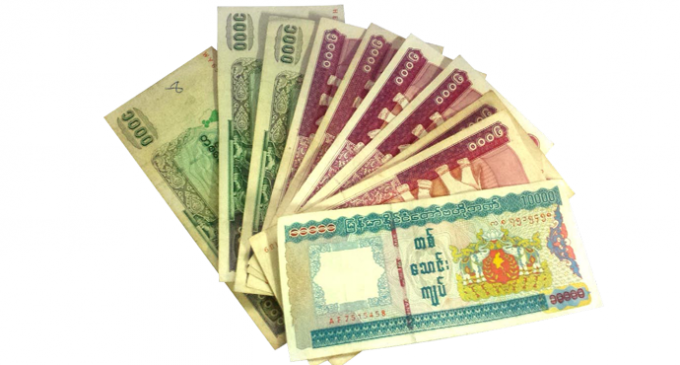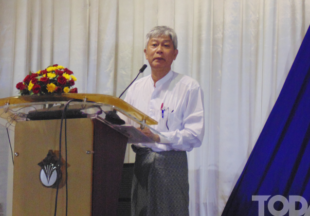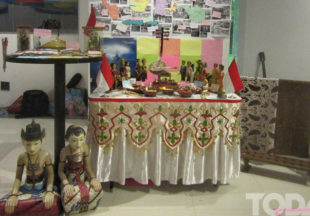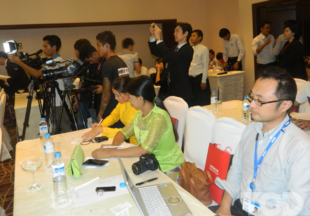Domestic Economy in Relation to the Depreciating Myanmar Kyat

Editors’ Comment : The fluctuations in Gold Price and US$ Exchange Rate is an issue we are facing currently and bound to face in the future also. The root causes may not be similar at all times but the method of tackling it cannot vary that much. We discussed with some of our skilled practitioners as to how the continually depreciating Myanmar Kyat against the continually soaring US$ Exchange Rate and Gold Price can effect Myanmar eco-nomy in the long run.
U Soe Win
Country Managing Partner
Deloitte Touche Myanmar Vigour Advisory Ltd.

If we look at the issue of the depreciating Myanmar Kyat from the viewpoint of an ordinary citizen and not according to complex economic theories, we can base our thinking on Remote Causes and Immediate Causes.
Regarding Remote Causes, since 20-25 years back, the Central Bank has been imper-ceptibly taken over by the Finance Ministry. The Procedures of the Foreign Exchange Regulations Act 1947 practised by the Central Bank Foreign Exchange Management Depart-ment have been relaxed. Myanmar citizens can open Foreign Currency Accounts. Bank trans-fers of US$ can be executed. Actually, these transfers can be made directly through the bank but people sell the dollars in the market at market rates. Then after a certain period where no other currency besides Kyat currency was allowed to be held, people gradually started holding US$ and openly traded them. The market exchange rate exceeded that of the stipulated Central Bank rate.
The Foreign Exchange Management Depart-ment cannot take any action and so the illegal dollar market gradually grew. Hundi remittances became compatible. Although according to Foreign Currency Control Procedures citizens and resident foreigners and companies cannot open bank accounts or make deposits abroad, affluent traders and wealthy individuals open foreign accounts abroad to facilitate their business. They set up businesses. They buy houses. It is not known whether they obtain permission from the Central Bank or not.
Due to that, Export Proceeds that should be acquired for the country’s exports are deposited abroad and licensed banks fill up their foreign Nostro accounts as much as they can. In this situation, the Control Committee or the Regulator should watch and monitor whether Myanmar is receiving the stipulated amount of income for the export of Myanmar resource goods and also check on the domestic Nostro Account whether accurate information has been provided to the Central Bank.
Along the lengthy Myanmar borders, illegal import and export goods are flowing in and out with acceleration. And due to immoral government employees, illegal border trade is growing excessively. From this, the Myanmar government is not receiving any tariffs or perhaps just receiving negligible rates. For illegal border trade, dollar is mostly used. The more the imports, the higher the dollar price. I feel that only if the Regulators can regulate imports, exports and border trade, dollar price will fall.
Recently, the Central Bank issued a directive stating that currency exchange within Myanmar shall be made not in Dollar currency but in Kyat currency only. This means that Kyat is the only Legal Tender within the country and there-fore settlements should be made solely in Kyats.
In Myanmar where various foreign currencies are in use, I think the Central Bank has the intention of initializing Single Currency system as in Singapore, Malaysia and Thai-land. This is fitting and proper but hardly anyone adheres to this directive and it came out rather late. One can even remark ‘Too late….Too late’.
To be able to fix the kyat as the Single Currency to be used within the country, the previous 20-25 year failed system must be corrected and since this cannot be done immediately, government departments should instill awareness of the carefully laid out directives issued by the Central Bank and put relevant pressure on the various Ministries, banks and proprietors. The first ones to adhere to the directive should be the government departments.
On the other hand, the Central Bamk itself should, after consultation with government departments and the IMF, control the Rate of Exchange to acquire as much stability as it can. Then only the Single Currency System of the Kyat currency will be successful. Otherwise, the directive issued by the Central Bank will be regarded in a lighter vein. If the directive cannot be implemented effectively, it will be difficult for the Central Bank to control the exchange rates and related inflations effectively in future.
In considering the Immediate Causes, the fact that dollar exchange rate is on the rise in the world market and that Myanmar exports are declining and valuable goods such as timber, gems are not generating reasonable income for the country but are being exported illegally should be considered. Border trade is importing home appliances, etc. The import of Construc-tion materials is appreciated. But unnecessary goods such as automobiles, beauty products, beer, etc. should be restricted, I think.
Action should be taken against illegal traders and all taxes should be levied accurately. The salary increase of government employees increase national expenditure and is one of the causes for the decline of the Myanmar Kyat value. I am not against the salary increase of government employees. I want them to receive higher salaries but only dutiful and worthy personnel should have the right to such salaries.
And also, unnecessarily increased sanction-ed strengths leading to payment of redundant personnel would add burden to government finance. If the Central Bank wishes to implement Single Currency Use of the Myanmar Kyat in the country, there are 6 main points that should be considered.
1. The dollar currencies in the hands of Myan-mar citizens in the country should be monitored systematically.
2. The dollar currencies deposited abroad by Myanmar citizens should also be monitored systematically.
3. Licensed banks and foreign bank enterprises should be monitored effectively. To facilitate trade, the foreign currencies requested by these banks to buy at the proposed rates should be obliged as much as possible. If the exchange rate fluctuates, the Central Bank can conduct interviews as necessary and action should be taken against banks which violate stipulated rules.
4. As suggested above, Government Depart-ments should concur with World Monetary Organizations and the Central Bank should work towards the stabilization of the exchange rate as much as possible.
5. The important thing is, I feel it is necessary for the Central Bank to win the confidence of Myanmar citizens. The day that the Central Bank can maintain the exchange rate at a certain point will be the day that the public will start placing their trust in the Bank.
6. With the trust thus gained, the dollars owned by Myanmar citizens within the country and abroad will be under the auspices of the Central Bank and the desired Single Currency System can then be possibly implemented.
Dr. U Maw Than
Rector (Retd.)
Yangon Institute of Economics

The possible outcome of the depreciating Myanmar Kyat is the increase in the cost of living. This is a result from the import of foreign commodities for which dollars have to be used thus leading to a rise in the cost of living. If the products of the country are exported abroad, the country will earn more.
There are two factors causing the deprecia-tion of currency value. One is internal and one is external. External means economic growth in countries such as the US and EU. Previously, if there was 1% growth in the economy of the US, it was surprising but now the growth has reached 3.5% and the number of unemployed has been reduced a lot. In England too, the number of motor cars produced has increased to 700,000. It shows that England’s economy is improving. As for EU’s economy, all member countries except Greece has improved. Especially the endowment of US economy leads to the depreciation of Japanese yen, Singapore dollar and Thai baht just like the Myanmar Kyat. That is why the decline of currency value is related to foreign economy.
Concerning the internal factor, the increase of salaries and budget deficit are the causes. The increased salary, once it gets into the hands of the public, causes price hikes which causes decline of the currency value. If the Balance of Payment shows budget deficit, currency value falls. I am a Director of the BOD of the Central Bank and what we discussed in the meeting was that 10,000 kyat notes are said to be issued for security reasons but the printing of new notes leads to a decrease in the value of currency. To put it briefly, the decline in currency value is not easy on the public as well as on the consumers.
When there is currency depreciation and businessmen reduce the salaries of employees or cut the number of staff to reduce expenditure, it is not a commendable step. Concerning Fiscal Policy, there is not much the Central Bank can do. If the currency that is circulating in the hands of the public decreases, for example, if Treasury Bonds and Treasury Bills can be sold, it can lead to the control of currency depreciation. This is in the hands of the banks rather than the public. But then again, the value of Treasury Bonds and Treasury Bills amounts only to 5% of the country’s national income.
U Than Lwin
Vice-Chairman (Retd.) of the Central Bank
Senior Adviser, KBZ Bank Limited
A rise in the currency value means that if the Kyat currency value rises, imported goods will be cheaper. Once when the exchange rate was 800 kyats to a dollar, exports were at a disadvantage. Now that Kyat value is falling, exports have become advantageous. On the other hand, imported goods cost higher. Why? Because hundreds of Kyats against a dollar make it a disadvantage. The current issue now is the market rate. The US dollar market rate is on the rise and there also is market price fluctuation. Therefore the dollar rate is rising unduly. What is important for the importers now is for them to import Essential Goods since the current dollar price is not favourable. Additional imports should be made only when the exchange rate becomes stable. One should be mindful this much. As for the exporter, this is an opportune moment. If one is at an advantage, more exports should be made. The more exports you make, the better it will be.
Since the Central Bank is now taking measures to control the exchange rates, the Kyat currency value will probably become stable. It would make the situation advantageous. But the control should be maintained for a long time. The Central Bank should watch out. Exporters and importers should watch out. Market fluctuations should be guarded against. Buying dollars needlessly is one way of fluctuating the market prices. One should not buy dollars out of anxiety. Within the country too, besides foreign trade and services, the use of foreign currencies should be stopped. The government has issued such an order but non-adherence to it creates market problems. Advice has been made to exercise close supervision on the matter. 
Dr. Aung Thura
CEO, Thura Swiss Ltd.
The consequences of Myanmar kyat depreciation
The consequences of Myanmar Kyat deprecia-tion effects both the Export Industry and the Import Industry. In the Import Industry, imports will be limited because of unfavourable ex-change rates. Although it is more favourable than before for the Export Industry, the role of the Export Sector of the Myanmar Economy is not a significant one so the benefits are not felt that much. If it is highly successful, it would be another matter. Imported goods are more expensive so Market Demand will fall. But products that cannot be substituted will still be imported by companies in spite of the market price. If the goods are very expensive and there are local goods not too different in quality, these will be substituted. Generally, currency value depreciation will have effects leading to a lower volume of imports. But there are other factors which can influence this effect. For example, if the national income increases, its citizens will have more income and the demand for foreign goods will increase. Therefore, we cannot say that import volume will directly fall. In short, import volume will not fall abruptly since there are Market Forces which can lessen import costs caused by unfavourable exchange rates.
As for foreign investors, I don’t think the Myanmar Kyat depreciation will effect their decision- making much. For them, the deprecia-tion will lessen their Production Costs. If the products are sold within the country, there will be not much profit. But if they have invested in the country for the purpose of exporting, there will be more benefits of course. Just as there are less expensive operational sectors, there still will be the currency depreciation, and hence the costs will be higher. Therefore, to a person who holds foreign currency, there will be advantages but not much. It is only the domestic consumers who have to bear the higher costs.
What Myanmar Entrepreneurs should do to prepare against Myanmar currency depreciation
If the Export Industry is ready, this is an opportune time when exports should be made. This is a time for consideration. Myanmar Entrepreneurs should consider export and make preparations for export. In the long run also, Export will be more advantageous. If you are only thinking of Import, the Currency Rate should be seriously taken into consideration. The difficulty right now is, it is not yet convenient to use Hedging against Foreign Exchange Rate fluctuations. If you can anticipate that there will be foreign currency income in future or that you will need to buy foreign currency, in economically advanced countries, Hedging can be used to transfer risks against Foreign Exchange Rates. The main thing is, if the Treasury Department of a company monitors its cash flow and projects the income and expenditure in foreign currency, Hedging can be used to counter Currency Risks. In foreign countries, they can employ Forward Contracts and Foreign Exchange Futures but in Myanmar these are not yet applicable so it is not too easy. So for example, if we have to buy dollars in another six months, what we have to ascertain is how much Cash Flow we have in hand, what will be the exchange rate in six months’ time. Then we need to decide whether to buy foreign currency in advance or not. If the economy is stable, these considerations are not required but when it is not stable, these are necessary. And when you give service to foreign companies, you need to consider whether to state the terms in foreign currency or Myanmar currency. If the agreement is stated in foreign currency, there may be profit or loss according to Myanmar currency fluctuation.
Although Myanmar entrepreneurs should consider taking up Export trading, this cannot be implemented within a short period. To be able to export, it is necessary to first manufacture products. Therefore, Myanmar entrepreneurs should have the potential to manufacture products if they wish to export. If the change in Currency Use is not going to be effected within a short period, there should be Build Up for Export. But although Build Up is commenda-ble, if the Currency Use change is due within a short period, the Build Up itself takes some time so not too many advantages can then be expected.
Translated by Mra Hninzi
./wp-content/uploads/2018/10/Emirate-Online-TDY.png)
































There are no comments at the moment, do you want to add one?
Write a comment